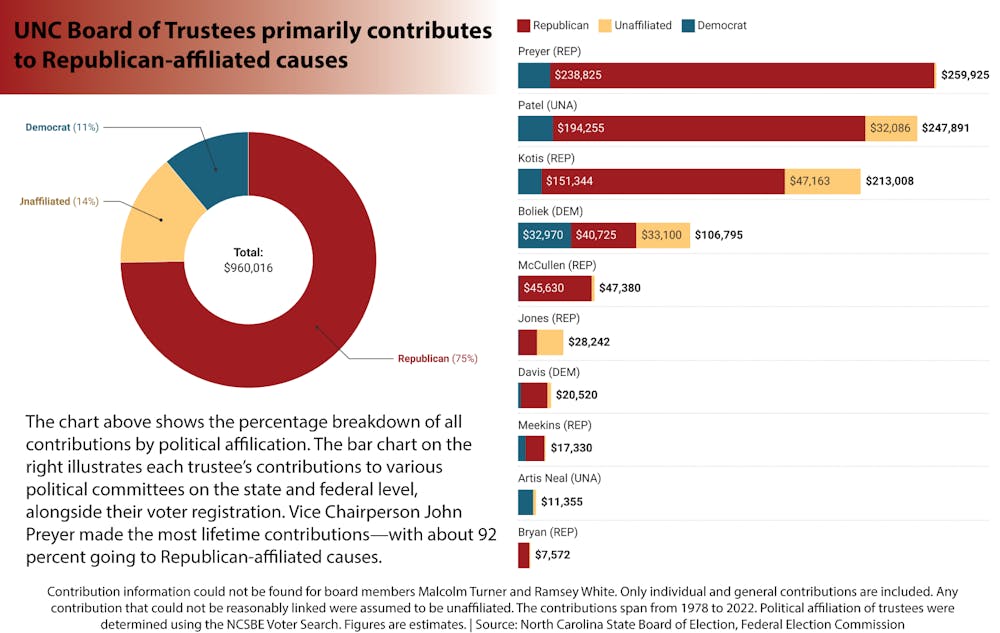Among the Board’s current members, there are six registered Republicans, two registered Democrats and two unaffiliated trustees. The remaining trustees, Malcolm Turner and Ramsey White, do not live in North Carolina, and recent voter registration could not be found.
Preyer and Kotis are registered Republicans. Patel is an unaffiliated voter, but about 78 percent of his donations went to Republican causes.
After changes to the appointment process in 2016, all 12 of the BOT’s seats are now appointed, either directly or indirectly, by the General Assembly. Four trustees are appointed by the legislature directly, and eight are elected by the UNC Board of Governors — which, in turn, is appointed entirely by the legislature. The North Carolina House of Representative and Senate have both had a Republican majority since 2010.
Prior to 2016, the governor had the ability to appoint two trustees, but after the 2016 election of Democratic Gov. Roy Cooper, the legislature moved the governor’s appointments to the General Assembly.
Jenna Robinson, president of nonprofit the James G. Martin Center for Academic Renewal, said it’s unsurprising that the majority-Republican legislature would appoint a more conservative Board. Before 2016, the Center operated under the name John W. Pope Center for Higher Education Policy and, until 2003, was a project of the John Locke Foundation.
“I think that most of what a board does isn't and shouldn't be political,” she said. “If you attend a Board of Trustees meeting, most of the time, they're looking at the function of the campus — the different programs that the campus is doing, and things like academic quality, athletics, fundraising, tuition, you know — those things aren't and shouldn't be political.”
But Bob Phillips, director of the nonpartisan democracy advocacy group Common Cause North Carolina, said that substantial political contributions can create the perception — whether grounded in reality or not — that the legislature influences the board’s decisions.
“It's not their job to rubber stamp what the General Assembly wants the University of North Carolina at Chapel Hill to do,” Phillips said. “It's to make the decisions that are based on what the mission of the institution is about.”
Half of the trustees — including Preyer, Kotis and Patel as well as Gene Davis, Ralph Meekins and chairperson David Boliek — have given to the campaigns supporting current N.C. House Speaker Tim Moore. All of these except Meekins and Davis have also donated to campaigns supporting N.C. Senate President Pro Tempore Phil E. Berger; both he and Moore are Republicans. Donations to either candidate from the Board's members total about $118,000.
Patel, who was appointed to the BOT by Moore in 2021, has donated about $14,200 to Moore’s campaigns. He said the two are friends, but that Moore has never contacted him to give opinions on issues going before the Board.
“Not once has any pressure been put on me about any vote or any decision that has come before the Board,” Patel said. “I have not had anybody, whether it's the House or the Senate, reach out and say, ‘Well, we think you should do this,’ or ‘We think we should do that.’”
Boliek did not respond to multiple requests for comment by the time of publication.
To get the day's news and headlines in your inbox each morning, sign up for our email newsletters.
Reality of political leanings
Kotis, who has also served on the BOG, said he does not view the BOT as partisan because any non-unanimous votes do not typically split along party affiliation lines.
Kotis has donated about $151,000 to Republican or conservative campaigns and committees, and about $15,000 to Democratic ones.
He said many of the trustees are friendly with those who appointed them, but he echoed Patel’s idea that no one is “buying” his votes.
“As a libertarian-leaning Republican, I don't make all my decisions through that lens, and neither do my fellow trustees,” Kotis said. “It's one part of who I am, but it's not the only part of who I am.”
But Roger Perry, a UNC trustee from 2002-2009, said he has seen a difference in how the Board operates since he was a trustee in the early 2000s.
“This Board of Trustees — you know, I'm not so much worried about their partisanship as I am the fact that they're getting outside their guardrails and trying to overly influence and usurp things that historically have been administered and handled at the faculty and at the administration level,” he said.
In email responses to interview requests, several trustees, including Preyer, referred The Daily Tar Heel to the Coalition for Carolina, a nonpartisan nonprofit group that advocates against partisan interference in University governance. The trustees requested that the donations of the Coalition’s leadership and members also be explored in this story.
Perry, one of the founders of the Coalition, said most of the steering committee members, including himself, are unaffiliated voters. The group isn’t political or partisan, he said, but more importantly, they do not have decision-making power at the University.
“To try and compare the Board of Trustees to an organization that is dedicated to support the faculty at Carolina and the chancellor — I mean, those aren't even apples and oranges,” Perry said. “Those are apples and elephants.”
Mimi Chapman, the current chairperson of the faculty and another founder of the Coalition for Carolina, declined to comment for this story.
Concerns over political involvement in new school
Most recently, the Board’s push to accelerate the creation of a School of Civic Life and Leadership, with the goal of “promoting democracy and serving to benefit society,” has prompted national controversy over civic discourse and free expression in higher education.
Patel said he did not feel like the resolution was an overreach because the Board did not tell the University specifics about the creation of the school. He said “the whos and the hows” were left up to the chancellor and the faculty.
“I wouldn't have expected outrage about this or uproar about this because it's what society should be,” Patel said. “So maybe, the fact that that's out there — it says something.”
Kotis said the concept of “civic life and leadership” is to get people talking on both sides of an issue by exchanging ideas respectfully.
In an interview with Fox & Friends after the resolution passed, Boliek said UNC lacks conservative professors. And, recently-conducted research suggested that conservative students self-censor themselves in classroom environments.
That same research reported that faculty — at UNC-CH and across the UNC System — are effective in promoting classroom dialogue. The report concluded that most respondents “perceived their instructors to encourage participation from students across the political spectrum.”
“If Carolina was not doing that, I'd be very disappointed,” Perry said. “But I think, clearly, it does do that. And it doesn't need to be pushed and forced and shoehorned into a situation where you have to do artificial things and unusual things to try and address a problem that simply doesn't exist.”
@hannahgracerose
university@dailytarheel.com





